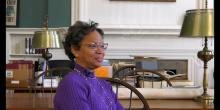
Bernadette Whitsett-Hammond
Lane High School, Burley High SchoolBiography
Bernadette Whitsett-Hammond, born on May 17, 1955, was raised on Page Street in a warm and close-knit community. Her family, particularly her mother and extended relatives, played a pivotal role in her early life, fostering a nurturing environment where everyone looked out for each other. She lived in an extended household with her cousin, Garwin DeBerry – also featured on this website.
Her educational journey began at Jefferson Elementary, a school she fondly recalls as a big family environment. The transition to McGuffey Elementary brought new challenges as she faced the realities of school integration. Assuming she would attend Burley High School, she entered Lane High School in 1969 after Burley closed.
Church and music were both significant aspects of Bernadette's life. She learned to play the piano and clarinet, performing in piano recitals, school bands and church choirs. Her church involvement and musical education provided a source of joy and stability during tumultuous times and added to her sense of community.
Bernadette's mother, an educator and guidance counselor, experienced her own set of challenges when she was assigned to teach at a predominantly white school. Initially met with fear and apprehension, her mother’s experience ultimately highlighted the transformative power of personal interactions and understanding in overcoming racial prejudices.
After high school, Bernadette pursued higher education at Vassar College, where she majored in Psychology and Education, following in her mother’s footsteps. She became a school psychologist, earning her degree in that field at The University of Virginia. When she returned to Charlottesville, she worked in both public and private schools. She was the only African American psychologist in the Charlottesville schools for the majority of her career.
Through her interview, Bernadette sheds light on the communal efforts to support desegregation, emphasizing the importance of community and resilience in overcoming societal barriers. Her story reflects the broader struggles and triumphs of her generation, offering valuable insights into the history of school integration in Charlottesville.
Full Interview
Clips
Bernadette Whitsett-Hammond
“It was an example of having to get to know a person before you judge them.”
Bernadette Whitsett-Hammond
Bernadette Whitsett-Hammond
Bernadette Whitsett-Hammond
“There just were not many Black teachers there during my time.”
Bernadette Whitsett-Hammond
“She was just a wonderful, wonderful individual to have as an instructor and as a role model.”
Bernadette Whitsett-Hammond
“I don’t feel that this was right. I want to support.”
Bernadette Whitsett-Hammond
“He could be in the band, but he could not perform with the band.”